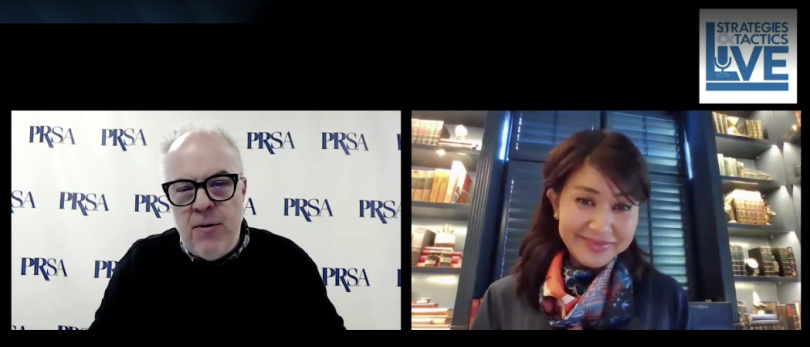“Leaders come in all shapes and sizes,” Mary Osako said. “Some are the loudest voice in the room. Some are not the loudest, but they might be the truest.”
Osako, vice chancellor for strategic communications at the University of California, Los Angeles, has learned to be true to herself and to those she leads, she said during the Dec. 15 episode of S&T Live, PRSA’s monthly livestream series on LinkedIn.
Losing yourself to fit in is often rewarded in the corporate world, but the pose can be draining, Osako said.
In 1996, she graduated from UCLA with a bachelor’s degree in psychology and a specialization in Asian American studies. For her first job after college, she worked as an administrative assistant for a Japanese airline at the Los Angeles airport. She contacted UCLA’s alumni network and was introduced to a speechwriter who gave Osako her first exposure to corporate communications. Her first PR job was with a two-person agency.
John Elsasser, editor-in-chief of PRSA’s award-winning publication Strategies & Tactics and host of S&T Live, asked how an early work experience had affected Osako’s career.
When she was hired at the telecommunications company Sprint, Osako looked up to her boss. But he told her she was a soldier in the corporate world, not a leader. It took Osako years to realize that what she had been told about herself may not have been true.
She went on to become Yahoo’s vice president of corporate international and public policy communications, chief communications officer at video game company Activision Blizzard and head of corporate communications at Amazon.
Moving up but wanting to be authentic
Trying to fit the mold was working, she said. “Being who I thought I had to be led me to an early career — and maybe even today — of being promoted pretty quickly and having all these really great jobs that honestly were outside of my skillset. Being given those opportunities to grow.”
But as her career progressed, “I remember feeling really tired. I remember thinking, ‘Gosh, what would it look like if I took off this corporate jacket that I was trying to piece myself into and I tried on the jacket that I like and that feels most comfortable for me?’”
She started wearing tennis shoes to work. She had been a private person but began to open-up more, telling jokes and revealing parts of her personality that had been closed off in her professional life.
“And man, it just felt better,” she said. “It became a heck of a lot more fun.”
Compared to when her career started 25 years ago, soft skills like empathy have become “incredibly important” in corporate America today, “especially as you lead teams,” she said.
As a second-generation Japanese American, “Culturally, the community in which I was brought up was a place where you don’t talk about your emotions. But vulnerability isn’t a weakness. I think it’s courageous.”
You can watch the playback here.







